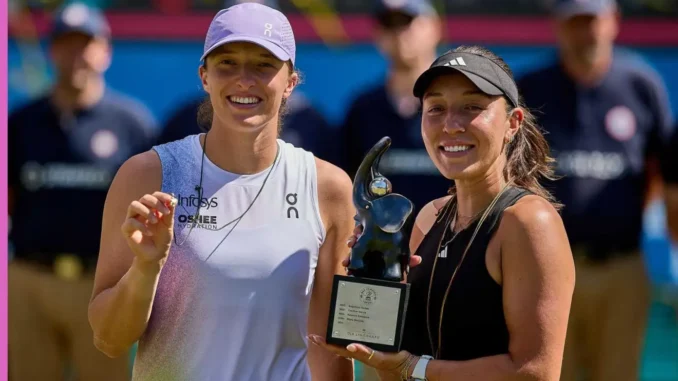
Iga Swiatek, the Polish tennis sensation known as the “Queen of Clay,” stunned the tennis world by clinching her first Wimbledon title in 2025, defying expectations on a surface long considered her weakest. Her remarkable 6-0, 6-0 rout of Amanda Anisimova in the final marked not only her sixth Grand Slam triumph but also her first senior title on grass, a feat that left even Swiatek herself in disbelief. American star Jessica Pegula, who faced Swiatek in the Bad Homburg Open final just days before Wimbledon, offered insight into the key change that propelled the 24-year-old to this historic victory: a significantly improved serve. “I thought she was serving a lot bigger,” Pegula remarked, reflecting on their high-level clash in Germany. This transformation, coupled with Swiatek’s newfound confidence on grass, has rewritten the narrative around her game and set the stage for an exciting hard-court season.
Swiatek’s journey to Wimbledon glory was anything but predictable. Despite her dominance on clay, where she’s won four French Open titles, and her 2022 US Open victory on hard courts, grass had always been a puzzle. Her best prior Wimbledon result was a 2023 quarter-final, and a shock third-round exit to Yulia Putintseva in 2024 had her questioning her grass-court prowess. “I feel like I have developed as a player and I had time to practice a little bit more [this year],” Swiatek said, crediting her preparation. After losing to Aryna Sabalenka in the 2025 Roland Garros semi-finals, she took a strategic approach, training for a week in Mallorca to hone her grass-court skills before competing at Bad Homburg. There, she reached her first grass-court final, falling 6-4, 7-5 to Pegula in a match she described as “super close.” Despite the loss, Swiatek saw hope. “I feel it is going a good way,” she told Pegula post-match, a sentiment that proved prophetic.
Pegula, the World No. 3, noticed a marked improvement in Swiatek’s serve during their Bad Homburg encounter. “She was serving really big in Bad Homburg and playing good tennis and beat good grass-court players,” Pegula noted. This bigger serve translated to Wimbledon, where Swiatek won 79% of her first-serve points, the joint-second highest in the women’s singles. Her serving prowess was evident in her dominant final, where she dropped just nine points to Anisimova in 57 minutes, becoming only the second woman in the Open Era to win a Grand Slam final without losing a game. “I was really competing throughout the whole two weeks,” Swiatek said, emphasizing how her serve gave her confidence. “I just leaned on that. Had a lot of confidence on every match and, and this happened. So it’s all pretty surreal and crazy.”
Swiatek’s transformation was guided by her new coach, Wim Fissette, who joined her late in 2024 after parting ways with longtime coach Tomasz Wiktorowski. Fissette focused on refining her movement and serve, critical for grass’s fast-paced, low-bouncing conditions. “We mainly focused on my movement and how I should stop before hitting the ball,” Swiatek explained. “Also, [we worked] on fast hands because obviously it’s important here not to stop the movement, even though the ball sometimes is fast.” Former player Andrea Petkovic praised Swiatek’s newfound patience, noting, “She has a bit more patience with herself. I think she’s also forgiving herself a bit more if she makes a few unforced errors on the grass.” This mental shift was crucial, as Swiatek had often been self-critical about her grass game, a sentiment Pegula addressed directly. “You know she is always kind of down on herself about grass, and I was like, ‘Hey, you’re playing really good on grass,’” Pegula recalled, amused that her pep talk preceded Swiatek’s Wimbledon triumph.
The road to the final wasn’t without challenges. Swiatek dropped just one set, against Caty McNally, her 2018 junior French Open doubles partner, and faced tough opponents like Jasmine Paolini and Clara Tauson. Her 6-1, 6-3 semi-final win over Paolini, last year’s Wimbledon finalist, showcased her growing comfort on grass. Off the court, Swiatek’s journey was equally tumultuous, with a one-month doping ban in November 2024 for trimetazidine contamination and a heartbreaking Olympic semi-final loss that left her in tears for hours. Yet, her resilience shone through. “Winning Wimbledon was always such a distant dream for me,” she wrote on Instagram, describing the “magical” moment of lifting the Venus Rosewater Dish.
For Pegula, the story was bittersweet. Fresh off her Bad Homburg title, she suffered a shocking 6-2, 6-3 first-round loss to Elisabetta Cocciaretto at Wimbledon. “It was almost like I got killed, like, so bad that you’re kind of just like, okay, just flush that one and move on,” she said, maintaining perspective. Now, as both players gear up for the US Open, Swiatek’s serve and newfound grass-court confidence make her a formidable contender, while Pegula aims to build on her hard-court success in Washington. Swiatek’s Wimbledon win, as Pegula predicted, proved she’s “very, very good on grass,” marking a new chapter for the Pole in tennis’s evolving landscape.
Leave a Reply